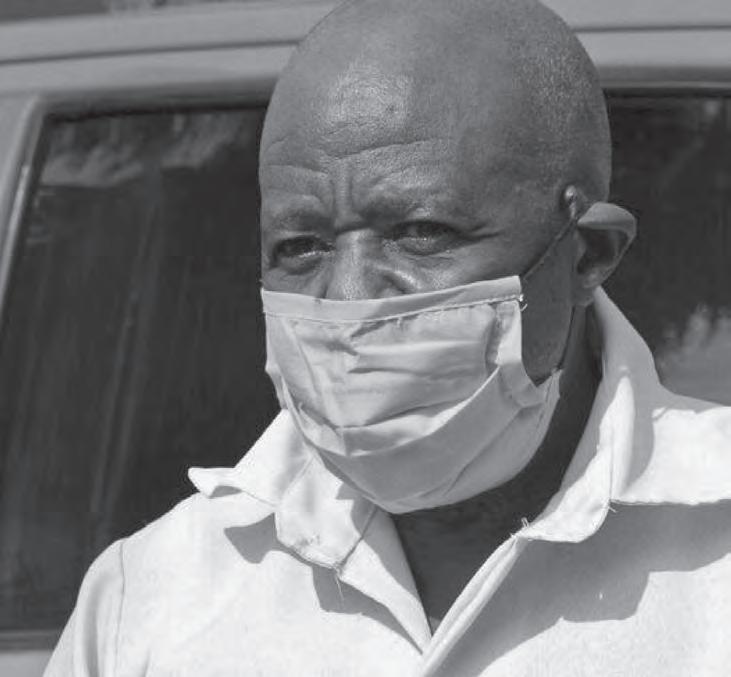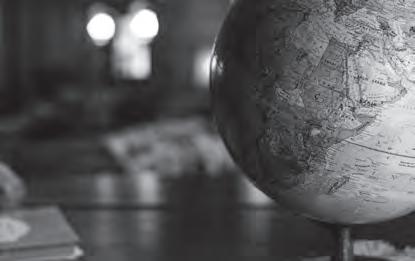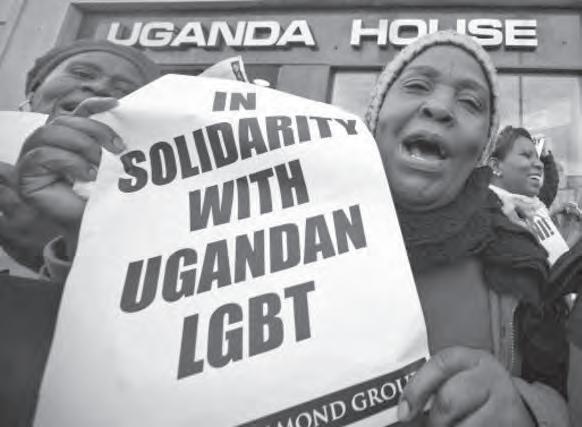
3 minute read
U.S. WINS RELEASE OF JAILED HERO OF “HOTEL RWANDA”
By Lisa Vives Global Information Network
From the cinematic screen of “Hotel Rwanda” to solitary confinement in a Rwandese jail, Paul Rusesabegina has been there and back.
Now, following a round of quiet diplomacy with two U.S. senior officials of the Biden administration and a final meeting with U.S. Secy of State Antony Blinken, Rusesabegina is free and heading to the U.S. to be reunited with his family in Texas. Thus ends an ordeal of 900 days linked to President Paul Kagame and his war on dissent at home and on opponents abroad.
Rusesabagina had been accused of terrorism over his ties to the Rwanda Movement for Democratic Change, a group that opposes Kagame’s rule. He has admitted having a leadership role in the group but denies links to its armed wing. Found guilty of the charges, he was sentenced to 25 years in the Mageragere prison in 2021. While his captors kept him blindfolded, security forces stepped on his neck and denied him food and sleep. A cancer survivor with hypertension and a history of cardiovascular disease, Rusesabagina was threatened with shortages of food, water and his medication.
In the Oscar-nominated film “Hotel Rwanda”, viewers were given a rare look inside Rusesabagina’s luxury Hotel des Mille Collines in the capital Kigali. There, 1,268 Rwandans, both Tutsis and Hutus, were saved from genocidal forces waiting beyond its walls. Rusesabagina was depicted as a hero who saved these lives.
As Rusesabagina, a Hutu married to a Tutsi, described in his autobiography, “An Ordinary Man”, i t was his ability to persuade the killers against targeting those who had sought refuge in the Hotel des Mille Collines that spared them. He was also able to use his connections and call in favors with some of the high-profile people who used to pass through the upmarket hotel. In addition he had cash.
The international community was slow to learn the horrific details of the Rwandan genocide as described in a book by Philip Gourevitch, staff writer of the New Yorker magazine, titled “We wish to inform you that tomorrow we will be killed with our families”. Gourevitch wrote about a Hutu pastor, Elizaphan Ntakirutimana and his son Gerard, who were later found guilty of summoning the Hutus to butcher the Tutsis in what became the worst single massacre in the entire 1994 genocide. The Hollywood movie may have saved the disaster from oblivion as many filled theaters to watch Don Cheadle in the role of Rusesabagina in 2004.
The Presidential Medal of Freedom was among the honors awarded to Rusesabagina over the years for risking his life to shelter hundreds of people when ethnic Hutus killed more than 800,000 people, mostly from the Tutsi minority.
By Lisa Vives Global Information Network


In defiance of the United Nations, the U.S. and other world government and human rights organizations, the Ugandan parliament has passed a bill imposing the most severe penalties against its gay community - criminalizing lesbians, gays and bisexuals for simply existing. Ugandan Members of Parliament tightened up the original text which provided for up to 10 years in prison for anyone engaging in homosexual acts or claiming to be LGBTQ+.

“The passage of this discriminatory text -probably the worst of its kind in the world-- is a deeply troubling development,” said the UN High Commissioner for Human Rights, Volker Turk, in a statement. “Let us be clear: this is not about ‘values.’ Promoting violence and discrimination against people for who they are and who they love is wrong and any disingenuous attempts to justify this on the basis of ‘values’ should be called out and condemned.”
The bill also impacts landlords and property owners who face penalties or imprisonment if their premises are used for “homosexual acts.” Parliamentary Speaker Anita Annet announced the bill’s passing – 283 to 389 - to cheers and applause. Museveni, meanwhile, has vowed not to bend to western pressure.
“Western countries should stop wasting the time of humanity by trying to impose their practices on other people,” he said earlier this month.
Other African countries with harsh anti-gay laws include: Algeria, Burundi, Cameroon, Eritrea, Ethiopia, Ghana, Kenya, Lesotho, Libya, Liberia, Malawi, Mauritania, Morocco, Namibia, Mauritius, Nigeria, Senegal, Sierra Leone, Somalia, South Sudan, Sudan, Eswatini, Tanzania, Tunisia, Uganda, Zambia, and Zimbabwe.
The U.S. has financial muscle if it chooses to use it – it now pays Uganda’s annual assistance budget exceeding $950 million as well as health assistance through PEPFAR.
Meanwhile, as an anti-gay bill draws more criticism, it also draws attention further away from another unpopular bill – namely a bill approving a controversial pipeline that threatens to destroy “one of our greatest heritages,” says B en Ntale, a Ugandan tour guide who has been bringing visitors to the Murchison Falls National Park for two decades. Roaring bulldozers and excavators are already toppling ancient t rees and carving roads to reach Uganda’s newest source of riches: oil, writes Abdi Latif Dahir in a recent New York Times expose.










